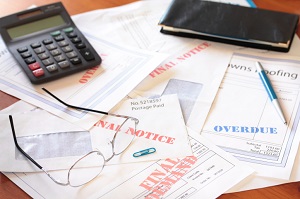 In today’s world, it is oftentimes necessary to take out some form of credit to pay for necessary items such as schooling, vehicles, a home, and emergency needs such as new tires for your car. In times of need, this available credit can be very beneficial. However, when you look at credit from the other side, this credit is now a debt you owe to a creditor. Owing debt is in no way a negative thing; in fact, most everyone you know probably owes some form of debt. If you find yourself in over your head with the debt you owe, a bankruptcy may be the relief you need.
In today’s world, it is oftentimes necessary to take out some form of credit to pay for necessary items such as schooling, vehicles, a home, and emergency needs such as new tires for your car. In times of need, this available credit can be very beneficial. However, when you look at credit from the other side, this credit is now a debt you owe to a creditor. Owing debt is in no way a negative thing; in fact, most everyone you know probably owes some form of debt. If you find yourself in over your head with the debt you owe, a bankruptcy may be the relief you need.
Bankruptcy is intended to give a debtor a fresh start so they can recover from a financial crisis and resume his or her life without the stress of debt problems. In many cases, people find themselves over their head with debt due to reasons beyond their control. For example, a person who loses his job may not be able to find a new one for many months. During this time he receives unemployment compensation, but this amount only covers his living expenses and he beings to fall behind on his debt payments. When he finds another job, he is not earning the same amount as before, therefore it becomes almost impossible to catch up on the past debt he owes. In order to get rid of his debt, stop creditor harassment, and to fully recover from losing his job, he can turn to bankruptcy for relief.
No matter the type of debt you are in, you are likely to find that bankruptcy will eliminate most types of that debt. Below are several types of debt that you can eliminate through a bankruptcy filing. While this list may not include all of the types of debt eliminated in a bankruptcy filing, it does include the most common types of debt that most people incur prior to filing a bankruptcy.
Credit Card Debt
Credit card debt is the second highest type of unsecured debt in the United States (student loans have recently exceeded credit cards as the number one type of unsecured debt for Americans). It is nearly impossible to repay substantial credit card debt when you are only able to pay the minimum monthly payments. In some cases, it would take people 15 to 20 years to repay their credit card debt if they pay the minimum monthly payment each month. Fortunately, you can get rid of your credit card debt by filing a bankruptcy.
Medical Bills
Even if you have insurance, a medical emergency could leave you with thousands of dollars in medical bills that your health insurance does not cover. When this happens, people are overwhelmed as they try to pay medical bills in addition to their other debts and living expenses. A bankruptcy is able to wipe out the medical bills that you owe.
Personal Loans
Personal loans are dischargeable in a bankruptcy case. This type of debt is common for those who are struggling to pay their bills and who have been taken advantage of by loan companies charging outrageous fees and interest rates. In most cases you can retain the property you promised as collateral and discharge the entire debt through a bankruptcy filing.
Cash Advance Loans
Cash advance loans are dischargeable through bankruptcy even though these companies want to convince you that this type of debt cannot be discharged.
Deficiencies and Other Judgments
If you have lost your home or vehicle and the lender filed for a deficiency judgment, you can include this debt in your bankruptcy case. Most other judgments are also dischargeable in a bankruptcy case.
There are other types of debts that are included in bankruptcy and are wiped out through a bankruptcy filing. If you have a question about a debt, you should schedule a free bankruptcy consultation to discuss your case in detail with a bankruptcy attorney.
Types of Debts Not Dischargeable in Bankruptcy
There are a few types of debt that bankruptcy does not eliminate; however, the debts that are not eliminated are more manageable after you file bankruptcy. For example, alimony and child support are not dischargeable in bankruptcy – you cannot get rid of your domestic support obligation by filing bankruptcy. Most taxes and student loans are also not subject to a bankruptcy discharge. However, once you get rid of your other unsecured debts, you have more disposable income to pay the debts that are not discharged through your bankruptcy. By getting rid of credit card debt, medical bills and other debts, you can concentrate on paying the remaining debts you owe so that you can become debt free and financially secure.
Owing debt is a very common part of life in the 21st Century. However, if you find yourself falling behind on your payments, it might be time to start looking for the debt relief solution that is right for you. For more information about consumer debt solutions, download our free Debt Solutions 101 eBook. In it you will find valuable information about various debt solutions that can help you start solving your financial problems.



